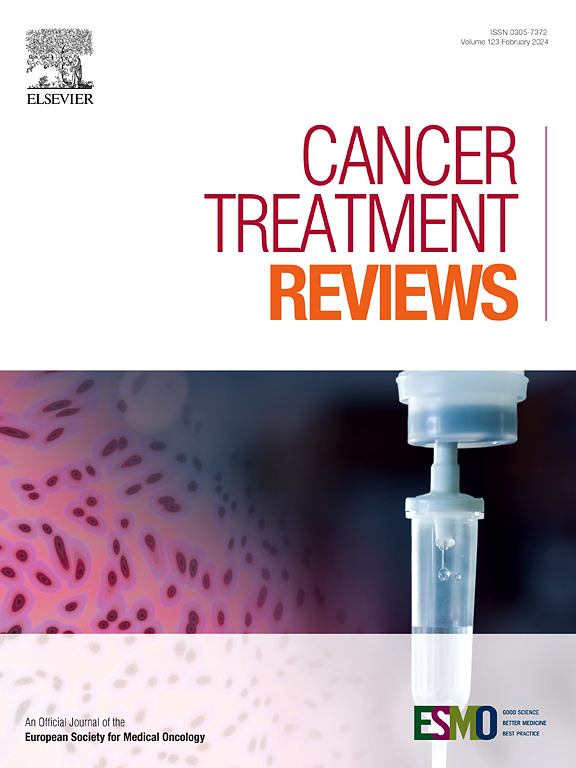铺平前进的道路:雄激素受体靶向治疗乳腺癌的进展和挑战
IF 9.6
1区 医学
Q1 ONCOLOGY
引用次数: 0
摘要
雄激素受体(AR)在乳腺癌中的作用对于临床前和临床研究至关重要。虽然ar靶向治疗是前列腺癌的标准治疗方法,但这种治疗策略在乳腺癌中的应用尚未确定。事实上,AR在大约60-90%的乳腺癌中表达,因此我们有必要更多地了解其对乳腺癌的预后和预测影响以及靶向潜力。在过去十年中,AR靶向疗法──包括AR拮抗剂和选择性AR调节剂──在乳腺癌治疗中显示出前景。然而,对AR在乳腺癌亚型中的作用的不完全了解阻碍了临床应用。缺乏标准化的AR表达阈值进一步使患者选择复杂化,强调迫切需要生物标志物驱动的策略来优化乳腺癌AR靶向治疗方法。在这篇综述中,我们通过讨论AR生物学、AR作为生物标志物以及AR靶向治疗的发展,概述了AR在乳腺癌中的临床前景。我们提出了我们的回顾,特别强调AR在ER阳性(ER+)和ER阴性(ER-)乳腺癌亚型中的独特作用。最后,本文阐述了阻碍ar靶向治疗临床前景发展的障碍,以及克服这些挑战的可能解决方案。本文章由计算机程序翻译,如有差异,请以英文原文为准。
Paving the path ForwARd: Advances and challenges in androgen receptor targeting in breast cancer
The role of androgen receptors (AR) in breast cancer is crucial for preclinical and clinical research. While AR-targeted therapy is a standard treatment for prostate cancer, the application of this therapeutic strategy to breast cancer has not been established. Indeed, AR is expressed in around 60–90% of breast cancers, making it imperative that we learn more about its prognostic and predictive impacts and targeting potential in breast cancer. Over the past decade, AR-targeted therapies ─ including AR antagonists and selective AR modulators ─ have shown promise in breast cancer treatment. However, an incomplete understanding of AR’s role across breast cancer subtypes hinders clinical application. The lack of standardized AR expression thresholds further complicates patient selection, underscoring the urgent need for biomarker-driven strategies to optimize AR-targeted approaches in breast cancer. In this review, we provide an overview of a clinical perspective of AR in breast cancer by discussing AR biology, AR as a biomarker, and AR-targeted therapy development. We present our review with a particular emphasis on the distinct roles of AR in ER-positive (ER+) and ER-negative (ER-) breast cancer subtypes. Finally, the paper addresses the hurdles that have impeded the development of a robust clinical landscape for AR-targeted therapies and possible solutions for overcoming these challenges.
求助全文
通过发布文献求助,成功后即可免费获取论文全文。
去求助
来源期刊

Cancer treatment reviews
医学-肿瘤学
CiteScore
21.40
自引率
0.80%
发文量
109
审稿时长
13 days
期刊介绍:
Cancer Treatment Reviews
Journal Overview:
International journal focused on developments in cancer treatment research
Publishes state-of-the-art, authoritative reviews to keep clinicians and researchers informed
Regular Sections in Each Issue:
Comments on Controversy
Tumor Reviews
Anti-tumor Treatments
New Drugs
Complications of Treatment
General and Supportive Care
Laboratory/Clinic Interface
Submission and Editorial System:
Online submission and editorial system for Cancer Treatment Reviews
 求助内容:
求助内容: 应助结果提醒方式:
应助结果提醒方式:


